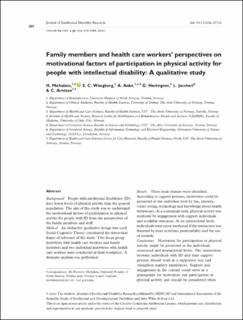| dc.contributor.author | Michalsen, Henriette | |
| dc.contributor.author | Wangberg, Silje C | |
| dc.contributor.author | Anke, Audny | |
| dc.contributor.author | Hartvigsen, Gunnar | |
| dc.contributor.author | Jaccheri, Maria Letizia | |
| dc.contributor.author | Arntzen, Cathrine | |
| dc.date.accessioned | 2021-02-04T14:24:17Z | |
| dc.date.available | 2021-02-04T14:24:17Z | |
| dc.date.created | 2020-06-10T22:35:09Z | |
| dc.date.issued | 2020 | |
| dc.identifier.citation | Journal of Intellectual Disability Research. 2020, 64 (4), 259-270. | en_US |
| dc.identifier.issn | 0964-2633 | |
| dc.identifier.uri | https://hdl.handle.net/11250/2726252 | |
| dc.description.abstract | Background
People with intellectual disabilities (ID) have lower levels of physical activity than the general population. The aim of this study was to understand the motivational factors of participation in physical activity for people with ID from the perspectives of the family members and staff.
Method
An abductive qualitative design was used. Social Cognitive Theory constituted the theoretical frame of reference of the study. Two focus group interviews with health care workers and family members and two individual interviews with health care workers were conducted at their workplace. A thematic analysis was performed.
Results
Three main themes were identified. According to support persons, motivation could be promoted at the individual level by fun, mastery, social setting, technology and knowledge about health behaviours. At a contextual level, physical activity was mediated by engagement with support individuals and available resources. At an interactional level, individuals were more motivated if the interaction was featured by joint activities, predictability and the use of rewards.
Conclusions
Motivation for participation in physical activity might be promoted at the individual, contextual and interactional levels. The interactions between individuals with ID and their support persons should work in a supportive way and strengthen mastery experiences. Support and engagement in the context could serve as a prerequisite for motivation and participation in physical activity and should be considered when developing interventions for physical activity for individuals with ID. | en_US |
| dc.language.iso | eng | en_US |
| dc.publisher | Wiley | en_US |
| dc.rights | Navngivelse 4.0 Internasjonal | * |
| dc.rights.uri | http://creativecommons.org/licenses/by/4.0/deed.no | * |
| dc.title | Family members and health care workers' perspectives on motivational factors of participation in physical activity for people with intellectual disability: A qualitative study | en_US |
| dc.type | Peer reviewed | en_US |
| dc.type | Journal article | en_US |
| dc.description.version | publishedVersion | en_US |
| dc.source.pagenumber | 259-270 | en_US |
| dc.source.volume | 64 | en_US |
| dc.source.journal | Journal of Intellectual Disability Research | en_US |
| dc.source.issue | 4 | en_US |
| dc.identifier.doi | 10.1111/jir.12716 | |
| dc.identifier.cristin | 1814939 | |
| dc.relation.project | Norges forskningsråd: 188932 | en_US |
| dc.description.localcode | © 2020 The Authors. Journal of Intellectual Disability Research published by MENCAP and International Association of the Scientific Study of Intellectual and Developmental Disibilities and John Wiley & Sons Ltd This is an open access article under the terms of the Creative Commons Attribution License, which permits use, distribution and reproduction in any medium, provided the original work is properly cited. | en_US |
| cristin.ispublished | true | |
| cristin.fulltext | original | |
| cristin.qualitycode | 1 | |

